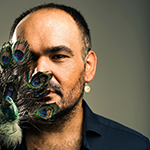The kitchen table
I place before you this phantom image of my childhood, a sweater vest, patched trousers, a crooked-collared shirt, a smile (wide as a stork’s wing), olives without meat, cheese heavy with mold, jelly with no fruit, a half-empty jar of nutella, my mother’s half-full cup of coffee, the quarter for my school snack, a tin of snuff (the absentmindedness of my father). there ought to be more on this table (propped with beer coasters), but I will leave it at that, the rest is the work of this poem
still as water / wary as wood is of fire / I remained hidden / in the depths of the well / under a heavy crust
I place before you this late pubescent fragment, place an adolesence in your lap. don’t try to tame it, to wash it, to comb its hair, to understand. let the circus animal behind these words howl. lay it down on the window sill, it needs to sleep, and dream, it needs to fashion the whisper of maple leaves with its paws. leave it be, it is worn from recounting, from walking through all the chambers of this palace, from the dueling voices that burrow through this poetry journal. the smell of burned toast will lead you there
in the hands of the living I am now open / peeled with the knife of time’s polyphony! / every word becomes a test of courage / every glance a narrowing of your eyes
I place a curse on these words (skin flourished with tattoos) and leave it there, I set about crafting the wings of the kite, my father says … I’ll come back, promise …
you will bind my hands / sew my mouth closed / but this heart / that sobs behind life / thirsts for naked fingers and toes / you can never sooth it again / now that it has sold itself
The epic of Hera
She lay down under the pine
and gave birth to me
with my umbilical cord she was blindfolded
the afterbirth streamed through blades of grass
all the way down to our doorstep
she rested her head on the ivory
she numbed her pain with the vernix
and lay like an injured mare
under this pine tree
every night my father left his wife / every night in her fury she wanted to tear him limb from limb, he returned after she fell asleep / she slept soundly spent from crying tired to the bone / every night the radio cries with songs of home / I lie in bed with a chalky fever / for a bid of lust she was impregnated, for a pretty dress, for a faraway land, for a bridal veil without a wedding
she bore me and then her death began
now I am the accursed fruit of her ravaged garden
the razor slit in her milky skin
I am the one, the bow, the arrow, the court, and the executioner
failure itself, the betrayal, the victim
the unintelligible voice
every night she arrives with her blindfolded eyes / climbs from the coach, given over to an unknown destination / every night we fall asleep to these acts / one cries, the other flees, no one finds a home / every night I write poems to rouse my thoughts / slink past tracks, past cheap brothels, absorbed in my world / because every night my father left my mother / every night in her fury she wanted to tear him limb from limb / now I know, everyone should fear their own birth
she bore me, then her death began
she drank the three thousand year old poison of motherhood
and lay herself down under the pine
I am the ivory beneath her head
the guard at her doorstep
the razor and the stitches across her wound
mother, forgive me
I have completed my work
Translator’s Note:
Silence is a phantom. It seeps through windows, slips through pores, fills tiny and vast rooms, unnoticed perhaps until a child goes to the breakfast table and everything on it reminds of what is not there, loved ones whose care is apparent in absence, whose love is expressed in the jars and tins of loneliness, everything half full, half empty. And the devastating recognition by the child, grown to adulthood, that he was unintentionally culpable, that as loved as he was, he was a silencer too by his mere presence, that “no one finds a home” where economic issues dictate the household. These two poems by German poet, Dinçer Güçyeter, move in this space of emptiness: a child at a table populated by symbols of family, and a mother whose individuality ceases with the birth of that child, and finally as time continues, with a poet instilled with “dueling voices that burrow through this poetry journal.”
I myself was what used to be called a “latchkey child” in 1970s lingo until so many children “came home to an empty house” that the buzzword rendered itself irrelevant. I remember wishing my mother were home to make me an after-school snack and at the same time feeling capable at meeting my own needs, in a kind of conflicted lonely independence that carries through into my ever advancing adulthood. Never once though did I consider what effect my mere presence had on my mother in such a concrete fashion. Güçyeter’s desire, urge, imperative to speak out on both counts, to reenact the scenes of silence are a vehicle for both indictment and remorse, representing attempts perhaps to exorcise the phantom.
The poetry collection these come from, titled My Prince, I am the Ghetto, is a multi-modal lyric collage grounded in the poet’s autobiography. In excavations of memory and depictions of social realities for Germans of all ethnicities, dialog pervades every poem, every poetic cycle, every altered image, every theme the book addresses. Like in “The Kitchen Table” and “The Epic of Hera,” many poems in the collection are made up of two or three parts, each voice and gaze in conversation with its phantom self, just as the world they are revealing has an acknowledged surface and an undercurrent of silence. Güçyeter does the talking for both sides, until perhaps the day when the phantoms come back to the metaphorical table in physical form and real-world dialog happens.

Dinçer Güçyeter grew up as the son of a barkeeper and a blue-collar worker. He went to night school to finish his high school diploma. From 1996 to 2000, he trained to be a tool and die maker. Occasionally, he worked in the food service industry. In 2012, Güçyeter founded Elif Verlag, a publishing house focused on poetry, financed by his part-time job as a forklift driver. His latest poetry collection, Mein Prinz, ich bin das Ghetto, won the Peter Huchel Prize in 2022. His first novel, Unser Deutschlandmärchen, was published in the fall of 2022 by Mikrotext.

Caroline Wilcox Reul is the translator of In the morning we are glass, by Andra Schwarz (Zephyr Press, 2021) and Who Lives by Elisabeth Borchers (Tavern Books, 2017), both from the German. Her translations have appeared in the PEN Poetry Series, The Los Angeles Review, Exchanges, Waxwing, The Michigan Quarterly Review, The Columbia Journal, and others.

 BACK TO ISSUE
BACK TO ISSUE